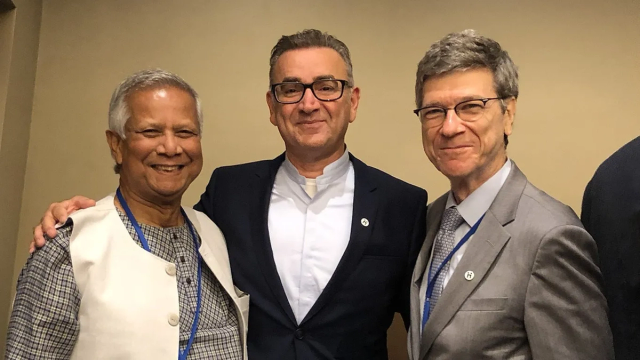SDSN’s SDG Financing Team Presents Preliminary Findings on SDG Costs for LIDCs with IMF at UNGA 73
On September 24th, SDSN and the International Monetary Fund (IMF) co-hosted the event SDG Costing & Macroeconomics: Spending Needs for Achieving Selected SDG s at the United Nations in New York. The event took place alongside the 73rd Session of the United Nations General Assembly (UNGA 73) and brought together high-level leaders, policymakers, and representatives from academia, civil society, and the private sector.
Speakers at the event included H.E. Ms. Amina J. Mohammed, Deputy Secretary-General of the United Nations; Dr. Vitor Gaspar, Director, Fiscal Affairs Department, IMF; Professor Jeffrey Sachs, SDG Advocate and Director, SDSN; and Professor Muhammad Yunus, Nobel Laureate, Founder of Grameen Bank and SDG Advocate.
The event also featured attendance and formal comments by Dr. Mahmoud Mohieldin, Senior Vice President for the 2030 Development Agenda at the World Bank, H.E. Dr. George Gyan-Baffour, the Minister for Planning of Ghana, and many members of the SDSN Leadership Council, including Mr. Djaffar Shalchi, founder of the Copenhagen-based Human Act foundation, whose generous support facilitated SDSN’s work in this area.
The SDG Costing event featured presentations from both the IMF and SDSN on the topic of the domestic budget needs, costs, and potential revenue sources for achieving select SDGs in the world’s emerging and low-income developing countries (LIDCs), defined as the world’s 59 countries with per capita income below $2,700 which are eligible for IMF concessional assistance.
The IMF presented the preliminary findings from its ongoing work to estimate baseline costs for achieving key SDG thresholds in the healthcare, education, and infrastructure sectors. Its presentation included an analysis of LIDCs’ additional spending needs as measured against multiple country growth scenarios through 2030, the results of which point to a significant gap in the available domestic revenues – both real and prospective – for LIDC governments with which to invest in and achieve the SDGs in these sectors.
Following the IMF presentation, SDSN presented the preliminary findings of its inaugural SDG Financing team report, Closing the SDG Financing Gap, which was circulated for comment and feedback. The report examines the fiscal burdens that LIDCs face for achieving the SDGs and builds on sector-specific, per capita cost estimates for realizing key health, education, infrastructure, biodiversity conservation, and social protection targets to demonstrate that governments of LIDCs will have to increase budget outlays significantly over their current spending patterns to achieve the SDGs, vastly outstripping their current revenues. It concludes that achieving the SDGs in these countries will require significant increases in domestic revenue generation, in tandem with increased and better targeted international development assistance from donor countries as well as from the private and philanthropic sectors.
Intended as the first publication in an ongoing portfolio of work on SDG costing and financing by its new designated SDG financing team, SDSN’s report builds on its previous work on the topic, including its 2015 reports Financing Sustainable Development: Implementing the SDGs through Effective Investment Strategies and Partnerships and Investment Needs to Achieve the Sustainable Development Goals: Understanding the Billions and Trillions, co-authored and authored by SDSN’s Executive Director, Guido Schmidt-Traub (with Director, Jeffrey Sachs on the former).
Forthcoming research conducted by the SDSN SDG Financing team will include country-level analyses of SDG financing in the Sahel region of Africa, surveying SDG spending needs against current domestic budget outlays.
For questions or draft copies of the report please contact Taylor Smith, Research Associate, SDG Financing, at [email protected].
